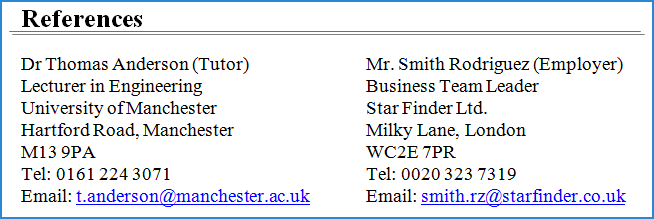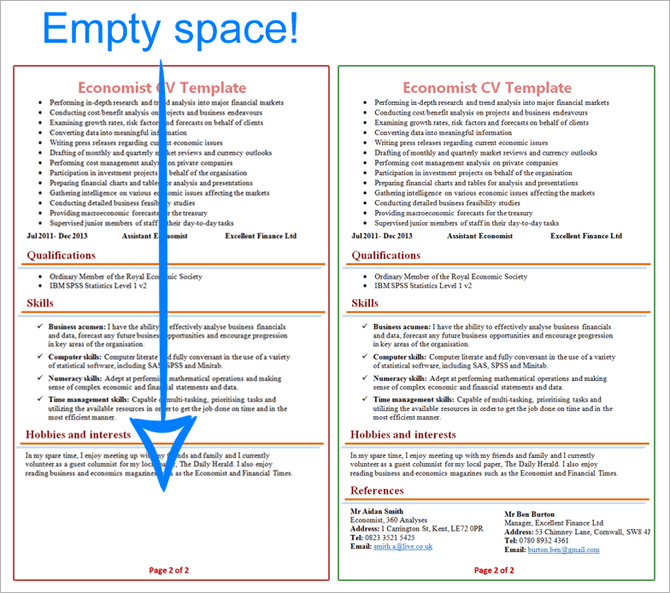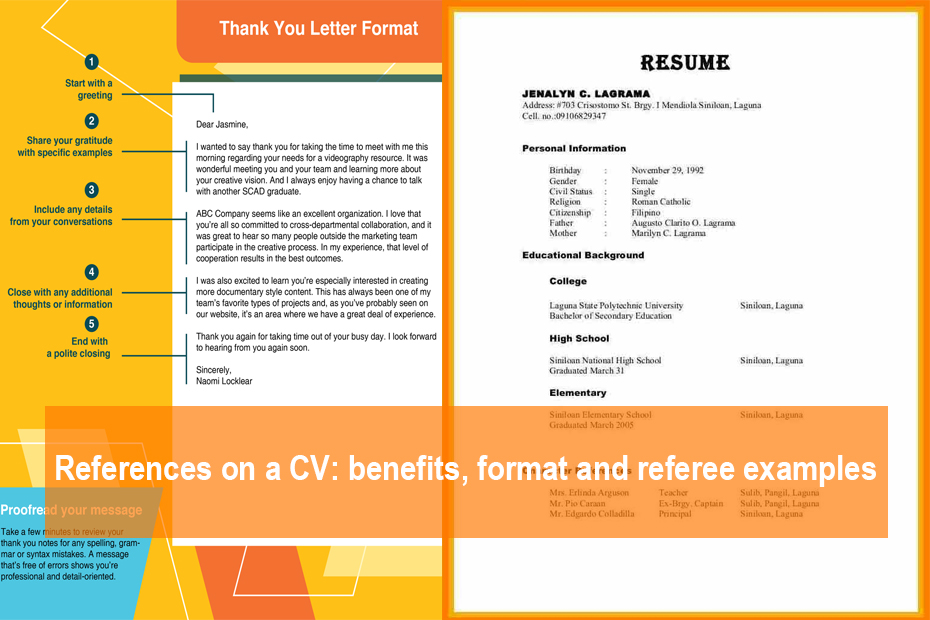References on a CV: benefits, format and referee examples
A traditional CV is made up of several key parts, including the references section at the end of the CV. It has been common practice to include at least one or two arbitrators who know you well, who work with you one way or another, and can vouch for the prospective employer.
Example of a CV references section:

1. What are references in a CV?
References are so-called referees who can testify to potential employers about your character, skills and abilities. You can think of your arbitrators as your personal advocates or ambassadors. The employer can call them or ask for some information about you in writing.
Some questions employers may ask your referees include:
- In what capacity do you know this person?
- What can you tell me about their skills, abilities, work ethic, punctuality, personal character, and behavior with other people?
- Can this person be employed?
- Will they be suitable for this job role and our organization?
- Should we consider hiring them?
You should be very careful about whom you put as a reference. Read this article to the end to learn how to choose the right people who will help you and that will not hamper your chances of getting a job.
2. Do I need to include references on my CV?
Depending on the circumstances, the answer is both yes and no.
Sometimes it may be necessary to add references to your resume, for example when requested by the employer, and at other times it may be best to skip this as references may not be required at this early stage of the job selection process.
When should I include references on my CV?
Some employers may request your cover letter, resume, references and / or letters of recommendation as part of the early stages of the job application process (i.e. before being invited to a job interview).
If this is the case, you should provide the employer with your references via the job application form or attached to your CV. However
, most employers will not ask for this information until later in the selection process.
Your reference can be a reputable and well-known person who will impress the reader; a member of parliament, dean of a university, director of a renowned company, or a person with honors (for example, MBE).
Including your referees in your resume makes life easier for some employers who may want to talk to your references before the interview phase.
By providing this information in advance, it can instantly “check on you” at any stage of the selection process. Remember, recruiters are not obliged to contact your referees only after the job interview phase.
Psychologically speaking, adding references adds a little more ‘weight’ and credibility to your resume because it shows that you trust your own past and have people who will vouch for your fit for the job when needed.
It also gives the impression that you have nothing to hide (for example, your poor past performance, no referees or being fired from your previous job).
For some applicants, especially school leavers, university students or those with no work experience, the CVs will be shorter than the full length of 2 A4 pages, leaving a large blank at the end of their CV.
Given the aforementioned benefits of adding references to your CV, and to improve the presentation of your CV, you may decide to include the references section to fill in the blank space and make your CV look “complete”.

Note: If you have more valuable information by which you can fill the empty space (e.g. additional qualifications or work experience), you should do so!
When shouldn’t I include references on a CV?
Since the inception of CVs, it has become common practice for job seekers to include their references in their resumes. In fact, some career counselors have gone so far to declare that adding a reference to a resume is highly recommended!
In reality, references on a resume are not a requirement; completely optional, and in some cases, it’s best to remove them from your CV. Should you include references on CV?,#How do you write references on a CV?,#What kind of references should I put on my resume?,#How do you send someone a CV with a reference?,#What do you say in a reference letter for a friend?,#How do you reference a reference in an email example?,#What if you have no references?,#Do employers call all three references?,#How do you format a list of references?,#Is it OK to write references available upon request?,#How many references should be on a CV?,#Who can I use as a reference for my first job?,#Can I use a friend as a reference?,#Do jobs actually call references?,#Are two references enough?,#What kind of references do employers want?,#What should you include in a reference?,#Who should you use as a reference?,#What do jobs mean when they ask for references?,#What are the three types of references?,#Who should you not list as a reference?,#Can you fake a reference?,#Can I use someone as a reference without asking?,#What do you do if you don’t have a job reference?,#Is it bad to put references available upon request on a resume?,#Why are references available upon request?,#What does EEO upon request mean?

Let’s examine the disadvantages of adding references to your CV:
- References at this early stage of the application process are not required and are completely irrelevant.
It takes up valuable space that can be used better by adding more important information to the person’s resume. - A candidate’s inability or failure to involve his current / previous employer may raise further questions or doubts.
- References can be provided on request; therefore, it is sufficient to write “Available on demand”.
- It can take a lot of time to find two suitable referees, ask for their personal information and ask their permission to use it as a resource. Why not waste this precious time looking for and applying for a job?
These are all valid arguments. Therefore, the following candidates shouldn’t write references on their CVs:
- Candidates who need additional space to include all important information such as education and employment history on their CV. Skipping references can free up valuable space to be used for this information that could strengthen the job application.
- Applicants who were dismissed, laid off or laid off by their most recent employer.
- Candidates who do not have two very good referees (well-spoken, well-spoken and professional).
Candidates who do not wish to add a reference to their CV should write: “References are available on request.”
If you want to learn how to write your references on your resume, read on!
3. Who should be references on a CV?
It is recommended that you provide two references on your CV. One of your referees must be your current or former employer and the assistant referee can be anyone who knows you well, for example:
- Current employer
- Previous employer
- Manager
- Supervisor
- Teacher
- Colleague
- Coach
- Trainer
You should be very careful about whom to choose as a reference. Not everyone who knows you well or wants to vouch for you may not be able to do this effectively and professionally.
Your Referees:
- Clear and well-spoken;
- Friendly and engaging;
- Authoritative and professional.
4. Can I use a friend or family member as a reference?
We are often asked:
My friend knows me very well, can he be my referee?
Answer is no. The purpose of referencing is for the employer to get a professional and impartial opinion of you and your skills. Having friends or family members as your references creates a “conflict of interest” (bias) and eliminates all purpose of seeking an honest and impartial opinion from an independent source.
Below are categories of people that you cannot use as a reference:
- Family members;
- Friends;
- People you don’t know;
- People who don’t know you well.
5. How many references to provide on a CV
In general you need to provide two references; one is your former employer (if you have one) and the other is someone who knows you well. However, the number of references may vary depending on the applicant’s circumstances. For example, it is a punishment for school leavers to include only one referee and university students to include two academic staff (teacher, lecturer or teacher) instead of one academic staff and an employer.
6. How to write references on a CV
- Your references should include the following details about each of your referees: full name, job title, address, phone number, and email address.
- Ask your referees for permission before giving their details to employers. This will also make them realize that they can get a phone call about you.
- Indicate the job title of your references. Without it, they might just be your friends or any Tom, Dick and Harry!
- Do not disclose personal phone numbers, instead use your referee’s work phone number (if possible).
- Use your most recent employer as a reference, as is common practice. Otherwise, an employer might wonder; “Why didn’t he add his last employer as a reference? What has this person got to hide?”
7. Where to put references on a CV
References section should be under your resume. If you decide to include your references in your resume, you must provide the personal information of your two referees here. On the other hand, if you do not want to include references to your resume, you can simply write: “References are available on request.”
8. Examples of good and bad CV references
Your references section can be written in many different formats.
The following are some good formats to follow: Should you include references on CV?,#How do you write references on a CV?,#What kind of references should I put on my resume?,#How do you send someone a CV with a reference?,#What do you say in a reference letter for a friend?,#How do you reference a reference in an email example?,#What if you have no references?,#Do employers call all three references?,#How do you format a list of references?,#Is it OK to write references available upon request?,#How many references should be on a CV?,#Who can I use as a reference for my first job?,#Can I use a friend as a reference?,#Do jobs actually call references?,#Are two references enough?,#What kind of references do employers want?,#What should you include in a reference?,#Who should you use as a reference?,#What do jobs mean when they ask for references?,#What are the three types of references?,#Who should you not list as a reference?,#Can you fake a reference?,#Can I use someone as a reference without asking?,#What do you do if you don’t have a job reference?,#Is it bad to put references available upon request on a resume?,#Why are references available upon request?,#What does EEO upon request mean?
Column format (long):

Sentence format (shorter):

Available upon request (shortest):


- The applicant did not indicate the referee’s full name or job title.
- The referee’s personal phone number and email address are provided (assuming unauthorized)!
- The address was long-termed and poorly presented.
Conclusion
The references section of your resume is important and should not be completely ignored. Depending on your circumstances and personal preference, you should add or simply write down all the details of the two referees in this section; “References are available on request.”
Good luck!














Comments